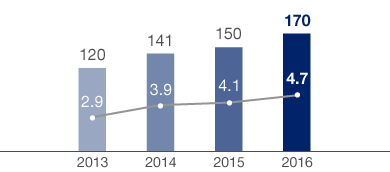Contracts, Remuneration and Additional Benefits
Collective Labour Agreements
Collective labour agreements govern pay and working conditions for approximately 89.5 % of employees in Germany (previous year: 88.0 %).
In May 2016, the parties to the labour agreement – the Association of German Seaport Operators (Zentralverband der deutschen Seehafenbetriebe e.V. or ZDS) and the trade union ver.di – agreed wage table increases of 2.5 % from 1 June 2016 with a twelve-month term for port workers at companies that operate at German seaports. Similar deals have been reached for further wage agreements of the HHLA Group. One component of the labour agreements is a collective demographic fund financed by HHLA to actively address demographic change and ensure age-, ageing- and performance-appropriate working conditions. Funds can only be withdrawn from the fund from 2021 onwards.
Appraisal and Remuneration Systems
The appraisal systems at the German companies contain both bottom-up and top-down components. Some of them are laid out in collective labour agreements, comprise variable remuneration components and are linked with training requirements for the company and staff.
The return on capital employed (ROCE) is also a significant parameter for determining variable remuneration components for executives and employees not covered by collective labour agreements. Performance-related remuneration components at executive level are calculated over a period of several years. This further enhances the focus on sustainable, long-term targets.
Developments in HHLA’s Part-time Employees
in Germany as of 31.12.

Part-time share in %
Flexible Working Models
A growing number of people across all employee groups and hierarchy levels in Germany are taking up the option of working part-time to tailor their working hours to different life stages. Offering part-time work is therefore an important way of retaining staff at the company. Allowing staff to adapt their working hours helps them to reconcile their professional and family commitments, look after close relatives or do charity work. In 2016, a total of 170 employees were in part-time employment positions – 20 more than in 2015 (previous year: 150). At the end of 2016, the ratio of part-time workers at HHLA in Germany increased to 4.7 % (31 December 2015: 4.1 %). The percentage of men in part-time employment rose to 28.8 % (previous year: 26.0 %). At the holding company, where most roles are clerical, the ratio of part-time workers (excluding apprentices) was approximately 15.4 % (previous year: 13.7 %).
Working Lifetime Accounts
As well as various company pension schemes, HHLA offers employees at eight affiliated companies working lifetime accounts. The aim is to enable employees to retire from active employment earlier without having their statutory pension reduced. In order to attract new employees, HHLA therefore offers attractive options that enable individuals to actively shape their own working lifetimes. Participation was mandatory for employees joining the company after 1 January 2005. This was amended in the collective labour agreement in 2016 and employees can now opt out of the scheme. Approximately 60 % of eligible employees have taken the opportunity to opt out of the mandatory contribution of additional working days. As of 31 December 2016, 1,134 employees had a working lifetime account (previous year: 1,121). This represents a participation ratio of 31.3 % in Germany (previous year: 30.7 %).
EBIT / Average Operating Assets.